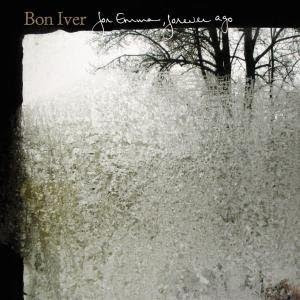99. For Emma, Forever Ago, Bon Iver (self-released, 2007; Jagjaguwar, 2008)
For Emma, Forever Ago is an album borne of circumstance rather than intention, a personal document whose primal expression and slow-burning catharsis allow it to resonate emotionally with listeners despite an impressionist approach that, like its cover image of an iced-over window masking the trees outside, offers beauty while rendering much of the content inscrutable.
In late ’06, following the breakup of his marginally successful group DeYarmond Edison, Justin Vernon decamped from the band’s adopted base of Raleigh, North Carolina, to his birthplace in Northwestern Wisconsin to spend the winter alone gathering his thoughts at his family’s cabin. He did not plan on a cohesive project; nonetheless, he fiddled about on instruments and recording equipment he’d brought along to pass the time between cutting firewood. Over the ’06-’07 holiday season, Vernon’s noodlings took shape and resulted in a new solo project he dubbed Bon Iver, a malapropism for a greeting meaning “good winter” that he picked up from watching Northern Exposure DVDs. Vernon issued the songs, originally intended as demos, in a small ’07 vanity pressing that caught the ear of Bloomington, Indiana, label Jagjaguwar, who issued the work nationally the following year. Vernon had recorded three previous solo albums and five more with groups, yet it was the unintentional cabin demos that brought him acknowledgment.
At its core a folk record, For Emma, Forever Ago features Vernon on acoustic guitar, makeshift uses of a drum set’s components, and a soulful falsetto recalling Lindsey Buckingham. Vernon’s adept engineering, use of effects, and layering of overdubs gives the album a dense, warm atmosphere belying its solitary origins. It is an album heavy on feelings--while the songs generally seem to deal with alienation from and within relationships, Vernon’s vocals are opaque and more is communicated through inflection, tone, and dynamics than by language. Frankly, Vernon is not a dazzling lyricist, and more enjoyment may be had if one avoids the provided lyric sheet that reveals the songs to be packed with free-association tangents. What is most striking about the record, then, are its moods and the strength with which his abstruse inner journeys can speak to the listener regardless of clarity. Snatches of language, allegories for Vernon’s personal explorations, slip through. Repeated like mantras, phrases such as “So ready for us/so ready for us” (Creature Fear), “What might have been lost” (The Wolves) or “Would you really rush out/for me now?” (Blindsided) produce an aura of ennui, reflection, and the confusion that follows a relationship’s end. The album’s most lucid piece, Skinny Love, finds Vernon abandoning his falsetto to sing, full-throated, a list of reminders to a flame who claims her “love was wasted”: “I told you to be patient/I told you to be fine/I told you to be balanced/I told you to be kind”; not so much angry as lamenting, it is the LP’s most gripping song. As he does with romance, he seeks equilibrium within himself; Lump Sum concludes, “Balance we won’t know/We will see when it gets warm.” Vernon followed For Emma with an EP of new songs, Blood Bank, its title track a straightforward composition; its remainder, though, consists with varying success of mood pieces like those of the album, an approach he continued on an ’09 collaborative LP with the band Collections of Colonies of Bees. Those efforts feel more contrived than the raw emotion of For Emma, though, and its cabin demos are his first timeless work.
Highlights: Skinny Love, Creature Fear, Lump Sum, Blindsided
Sublime bit: Vernon’s between-verse wails of “My my my/My my my/My my” in Skinny Love.
Read the NOYOUCMON mission statement here.


No comments:
Post a Comment